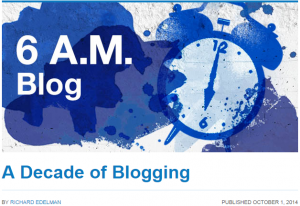Lessons in thought leadership

About the author
Richard Bailey Hon FCIPR is editor of PR Academy's PR Place Insights. He teaches and assesses undergraduate, postgraduate and professional students.

It’s easy to understand PR for product companies. You make heavy use of media relations and seek to promote the product through launches and reviews.
But how do you do public relations for professional services firms?
Lawyers, accountants, management consultants and PR consultancies don’t offer a calendar of product launches. They offer specialist services to targeted groups and need to be seen as experts in their field.
This is what we mean by ‘thought leadership’. It’s how consultants and professionals seek to be regarded and the way in which they attract invitations and hope to secure new business.
To explain the process better, here’s my personal report on some thought leaders in public relations. I can’t know everyone and don’t seek to report on every initiative, but I am entitled to a view as a commentator on the industry through this magazine and as someone who can recommend young talent to employers.
Two global consultancies appear to me to have positioned themselves ahead of the pack. Let’s learn some lessons from them.
Edelman
- Positioning: the tag of ‘the world’s largest independent public relations consultancy’ is important for Edelman. This is a privately-held family firm (see below), not owned by a larger marketing services group.
- Leadership: Inheritance may not be the best qualification for a job (outside the monarchy and aristocracy), but now into the second generation it’s working well for Edelman. Richard Edelman guides the firm and provides thought leadership for the industry through his weekly blog posts (now running for ten years) and through his public appearances.
- Recruitment: There was a time last decade when Edelman was voraciously recruiting blogging and (social) media talent. Not all talented individuals make great team players and some have since moved on, but in professional services, as in professional sport, you have to be willing to invest in developing or buying in talent.
- Research: The Edelman Trust Barometer, now in it’s 14th year, is a widely-cited and reported piece of research. It gives the firm a talking point when gloabal leaders meet at the World Economic Forum in Davos.
- Academic: There’s often a large gap between public relations in theory and in practice. Edelman has done much to bridge this gap by hosting an annual academic summit to foster exchanges between the two camps. This happens in the US, but I have also been a beneficiary of Edelman’s approach when they funded me and a postgraduate student to attend and present at a social media conference in Brussels in 2008.
- Legacy: Edelman marked its 60th anniversary in 2012 and founder Daniel Edelman died early in 2013.
Edelman has done so many things so well that it appeared for a while to be an unchallenged thought leader in global public relations. But where one can lead, others can follow. Edelman now has a serious competitor in global public relations thought leadership.
Ketchum
- Professional bodies: There are a couple of adjoining desks in London that rival Richard Edelman’s for global significance. One is David Gallagher’s: he’s currently president of international consultancy network ICCO (and recent recipient of a PRSA award for achievement in international public relations). The other is Stephen Waddington’s, this year’s CIPR president. That’s a big investment in voluntary effort that should be justified in terms of industry thought leadership.
- Research: Where Edelman has its Trust Barometer, Ketchum supports the annual European Communication Monitor survey. This year’s results are being presented at a free webinar next week.
Publications: No one has been more prolific in recent years than Stephen Waddington. He’s co-author (with Steve Earl) of Brand Anarchy (2012), Brand Vandals (2013), co-editor with Rob Brown of Share This (2012) and Share This Too (2013), he blogs tirelessly at wadds.co.uk and produces free ebooks too (like last week’s Blogging for Beginners). What’s the ROI? He won’t be challenging JK Rowling amongst Bloomsbury’s high-earning authors, so the payback must be in renown and recognition (ie in thought leadership). - Recruitment: Thought leaders don’t only come up with big ideas. They also pay attention to detail. I’ve been impressed how Ketchum handles interns, not least in paying them for their time.
- History: Ketchum may now be part of Omnicom, it may have gone through several name changes (you still see references to Ketchum Pleon), but it claims an even longer history than Edelman. It’s over 90 years since George Ketchum set up his business in 1923.
- Creativity: How to ensure a flow of fresh ideas, and how to enthuse the next generation in the business? Ketchum’s Mindfire is a creative crowdsourcing site that rewards student participants for their ideas in response to real client challenges.
So thought leadership is a public relations strategy for professional services firms.
Like any public relations programme, the individual elements are easy to copy. What’s hard is joining the dots and telling a coherent story; getting management buy-in and willingness to commit for the long-term. Some of these commitments are now into their second decade: that’s consistency.